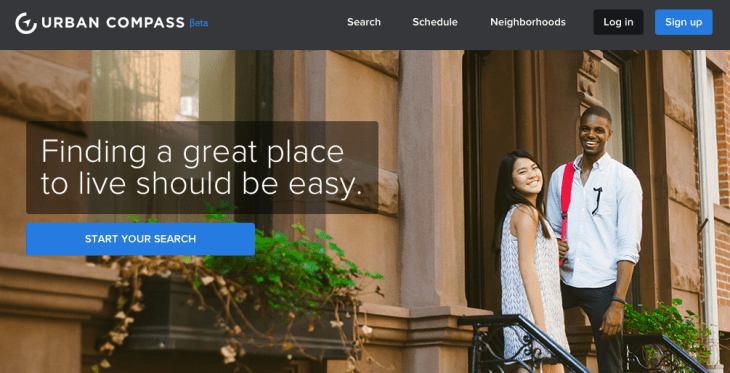Urban Compass, the young New York startup that emerged from stealth mode in May with a home rentals platform and accompanying hyperlocal social network, has closed a Series A round of funding totalling $20 million. The new investment values the company at what sources tell me is $150 million.
With the news, Urban Compass is also announcing some extra, strategic investors in the form of Advance Publications, the parent of Conde Nast; and Marc Benioff, the founder and CEO of Salesforce.com. Existing, disclosed investors from Urban Compass’s $8 million seed round, including Founders Fund, Thrive Capital, .406 Ventures and others, also participated in the Series A.
As a bit of background on Urban Compass, the company raised its outsized seed round in December 2012, from top-shelf VCs, while still very much under the radar. Part of the early VC boost was on the strength of the founders: before Urban Compass, CEO and co-founder Ori Allon worked at Twitter as its director of engineering, after Twitter acquired his startup, Julpan. Before that, he worked at Google after the search giant bought his previous startup (which hadn’t even gone so far as to launch; it was essentially Allon’s PhD thesis about a new search algorithm called Orion, which is now a part of Google’s search engine). Co-founder Robert Reffkin, meanwhile, hailed from Goldman Sachs and has made a number of marks in civic and charitable leadership.
It’s the respective strength of these two founders — one with the technical muscle; the other who is very close to thinking about what’s needed in the urban ecosystem, not to mention a strong finance background — that has led Urban Compass to thrive. “Things have been exceeding all expectations” since its launch in May, Allon tells me. He says the main site has “great traffic”, and people are actually using the platform, quite a lot. The startup has doubled revenues two months after launch, and in October expects to be generating revenues of $1 million/month. “We have a clear path for being profitable,” Allon says, “although we will need to invest a lot for the next stage of growth.”
So what will that next stage of growth entail?
Right now, Urban Compass’ platform effectively acts as a one-stop shop for those living in New York looking for an apartment. Using the platform, you can search for apartments (with real-time availability); schedule appointments to view them; get a tour of those places, and the surrounding area, with Urban Compass’ “neighborhood specialists”; and then set up monthly rental payments. Urban Compass’ fees are 7.5% on deals that do not involve brokers; 12.5% for those that do.
From this, the company is moving in a couple of different directions. Down the line, there are plans to expand to further cities outside of New York city — the focus, Allon says, will continue to be on urban centers for the time being. “Every big city is a candidate,” he notes.
But first, there will be further steps to enhance what Urban Compass offers to existing users — specifically in the area of aftermarket services. In other words, after Urban Compass helps you find your next apartment and connects you with other locals and nice places to eat, it will make sure you have broadband, furniture, and whatever else you will want to turn your apartment into a home.
This will tap into some of the search technology that Allon is expert at: “People provide a lot of information to us already,” he says. That will help Urban Compass in turn provide those people with more useful data to help fill out their new places. It will also mean that the company potentially could start to create new revenue streams on top of the commissions that it takes on rentals: these can be by way of affiliate deals, or straight advertising, for example.
Of course, there are a number of other competitors in the crowded real estate market, with companies like Zillow and Craigslist also playing strong roles. Where Urban Compass stands out is in the simplicity of its offering, with a slick interface that will appeal to urbane ubanites; and how it couples the service with live people who help would-be renters through the process.
But competition is also why Urban Compass will have to step up how it plans to enhance its service next.
This is where the Advance Publishing investment could come in handy. It is an interesting one for a couple of reasons. First, it could help Urban Compass ramp up the content that it offers users on its site. Second, it presents new channels for marketing Urban Compass, using Advance’s publishing network. It comes at a time when Conde Nast is making a number of other strong moves into online investments, with many focused on e-commerce and (predictably) fashion. Real estate, and the kind of upmarket, smart version of it as promoted by Urban Compass, seems a very natural complement to that.
